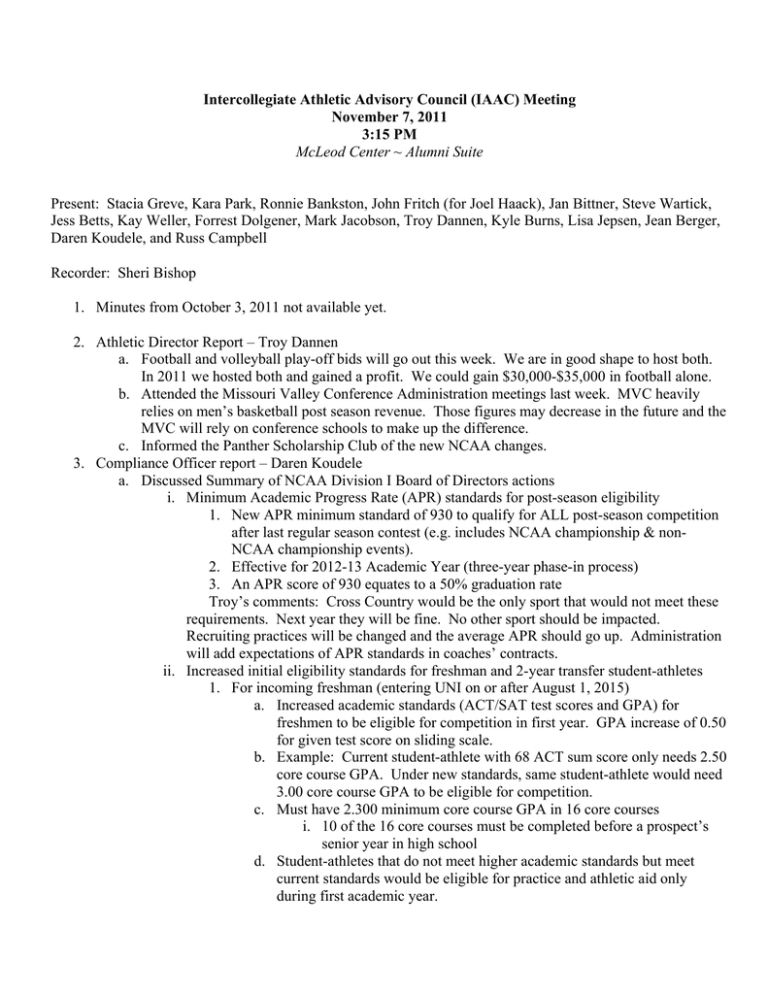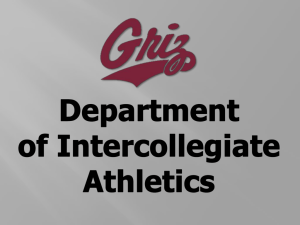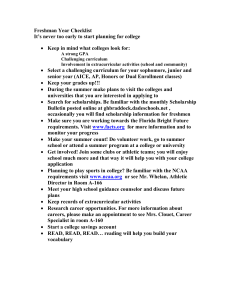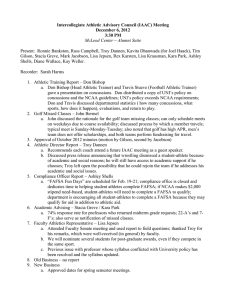Present: Stacia Greve, Kara Park, Ronnie Bankston, John Fritch... Intercollegiate Athletic Advisory Council (IAAC) Meeting November 7, 2011
advertisement

Intercollegiate Athletic Advisory Council (IAAC) Meeting November 7, 2011 3:15 PM McLeod Center ~ Alumni Suite Present: Stacia Greve, Kara Park, Ronnie Bankston, John Fritch (for Joel Haack), Jan Bittner, Steve Wartick, Jess Betts, Kay Weller, Forrest Dolgener, Mark Jacobson, Troy Dannen, Kyle Burns, Lisa Jepsen, Jean Berger, Daren Koudele, and Russ Campbell Recorder: Sheri Bishop 1. Minutes from October 3, 2011 not available yet. 2. Athletic Director Report – Troy Dannen a. Football and volleyball play-off bids will go out this week. We are in good shape to host both. In 2011 we hosted both and gained a profit. We could gain $30,000-$35,000 in football alone. b. Attended the Missouri Valley Conference Administration meetings last week. MVC heavily relies on men’s basketball post season revenue. Those figures may decrease in the future and the MVC will rely on conference schools to make up the difference. c. Informed the Panther Scholarship Club of the new NCAA changes. 3. Compliance Officer report – Daren Koudele a. Discussed Summary of NCAA Division I Board of Directors actions i. Minimum Academic Progress Rate (APR) standards for post-season eligibility 1. New APR minimum standard of 930 to qualify for ALL post-season competition after last regular season contest (e.g. includes NCAA championship & nonNCAA championship events). 2. Effective for 2012-13 Academic Year (three-year phase-in process) 3. An APR score of 930 equates to a 50% graduation rate Troy’s comments: Cross Country would be the only sport that would not meet these requirements. Next year they will be fine. No other sport should be impacted. Recruiting practices will be changed and the average APR should go up. Administration will add expectations of APR standards in coaches’ contracts. ii. Increased initial eligibility standards for freshman and 2-year transfer student-athletes 1. For incoming freshman (entering UNI on or after August 1, 2015) a. Increased academic standards (ACT/SAT test scores and GPA) for freshmen to be eligible for competition in first year. GPA increase of 0.50 for given test score on sliding scale. b. Example: Current student-athlete with 68 ACT sum score only needs 2.50 core course GPA. Under new standards, same student-athlete would need 3.00 core course GPA to be eligible for competition. c. Must have 2.300 minimum core course GPA in 16 core courses i. 10 of the 16 core courses must be completed before a prospect’s senior year in high school d. Student-athletes that do not meet higher academic standards but meet current standards would be eligible for practice and athletic aid only during first academic year. i. To continue practice in spring semester, student-athlete must pass a minimum of 9 hours in fall semester. 2. For incoming 2-year transfers (effective for transfer students entering junior college in Fall 2012) a. These standards likely would affect transfer student-athletes entering UNI 2013-14 or later b. Increased minimum transferrable GPA for eligibility from 2.00 to 2.50 c. Limits use of physical education activity credits to 2 credit hours d. Requires 3 additional transferrable hours in physical/natural science (in addition to current requirement of 6 hours of English and 3 hours of math) for non-qualifiers. Troy’s comments: 37% of this year’s football class would not be eligible this year if this rule was in effect currently. In some schools 50% of studentathletics would not be currently eligible. This rule would eliminate those student-athletes who just come to school to play sports. iii. Financial Aid Changes 1. Permissive change—multi-year scholarships for student-athletes a. Effective for awards beginning August 2012, at our discretion, all athletic scholarships may be awarded for multiple years until a student-athlete exhausts eligibility. b. Current rules restrict athletic scholarships to a maximum of one academic year. Then each scholarship is annually renewed, reduced, or cancelled for each following year. 2. Permissive change—cost of attendance and “miscellaneous expense allowance” scholarship for student-athletes a. Effective for awards beginning August 2012, at our discretion, all studentathletes receiving a full grant-in-aid athletic scholarship may receive an additional “miscellaneous expense allowance” up to the value of “cost of attendance” or $2,000, whichever is less. b. NCAA Student-Athlete Opportunity Funds or other institutional aid (e.g. academic or need-based) may be used to provide the additional aid. c. Conferences are working on guidelines for institutions in allocating this supplement. d. Lots of questions/issues still being evaluated about this rule change. 3. Equivalency sports—exemption of all non-athletic financial aid a. Effective August 1, 2012 – for all equivalency sports, only athletic aid will count toward NCAA team maximum scholarship limits (e.g. no other institutional or outside aid would be “countable”). 4. Equivalency sports—minimum grant-in-aid requirement for student-athletes (to be finalized by the Board of Directors in 2012) a. Proposed minimum scholarship level (10%) to each student-athlete that receives athletic aid (could eliminate “books only” scholarships). b. Effective Date—TBA. Must be approved by Board of Directors in January/April 2012. Troy’s comments: This Wednesday is signing day for some sports. At this time we are offering 1 year with no cost of attendance. The cost of the offering an additional $2,000 at UNI would be approximately $230,000. We will have to fund to be competitive within the league. Coaches will have to decide how it will be allocated using the current budget figures. Currently 4. 5. 6. 7. student athletes do not have access to the same scholarships as the student body. Troy plans to discuss this with Terry Hogan. The academic changes should be a positive on campus. The board is looking at reducing the number of scholarships: women’s basketball 15 to 13, men’s basketball 13 to 12, football 63 to 60. They are also looking at decreasing the number of competitions. They plan to streamline and modify the NCAA manual. We may see in 2012 changes in men’s basketball recruiting practices. Recertification update – Jean Berger a. Athletics Certification Peer-Review Team Report – see handout i. 18 issues were identified. 3 of those issues will need to be resolved. 1. The head men’s basketball coach’s office is bigger than the head women’s basketball coach’s office in the McLeod Center. There is a plan in place to increase the size of the head women’s basketball coach’s office to be equal to the men’s. 2. Courtesy car distribution is not balanced between the head men’s and head women’s coaches. As of 11/1/11 the three head coaches who did not have a courtesy car received a stipend. The athletic department will compare courtesy cars and stipends to determine the most cost-effective method for future allocations. 3. Not effectively monitoring minority issues among athletic staff. Department will work with OCEM to productively improve monitoring practices and policies. Review of missed class policy – Jean Berger a. Missed class days by sport – see handouts. Women’s basketball will miss fewer days this year because of playing on Fridays and Sundays. With the new class missed policy in place, student athletes are attending classes on a regular basis. Faculty Athletic Representative report – Lisa Jepsen a. Will discuss nominees for NCAA postgraduate awards at a future date. Old Business a. Exit interviews summary – tabled b. Exit interview process for fall sports – Jean Berger & Lisa Jepsen i. Kay Weller, Mark Jacobson and Russ Campbell volunteered to administer the surveys. They will work together to schedule the team meetings. Athletic administration will not be present during the process. Seniors from volleyball, football, soccer, and cross country will take this survey. They will expect 25-35 to take the survey. Meeting adjourned Next meeting: December 5, 2011



